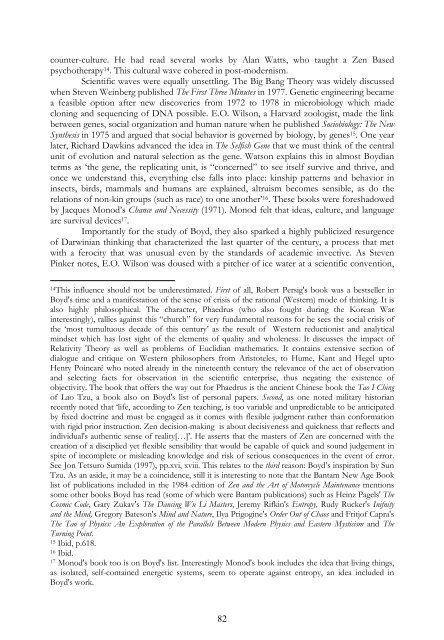Science, Strategy and War The Strategic Theory of ... - Boekje Pienter
Science, Strategy and War The Strategic Theory of ... - Boekje Pienter
Science, Strategy and War The Strategic Theory of ... - Boekje Pienter
Create successful ePaper yourself
Turn your PDF publications into a flip-book with our unique Google optimized e-Paper software.
counter-culture. He had read several works by Alan Watts, who taught a Zen Basedpsychotherapy 14 . This cultural wave cohered in post-modernism.Scientific waves were equally unsettling. <strong>The</strong> Big Bang <strong>The</strong>ory was widely discussedwhen Steven Weinberg published <strong>The</strong> First Three Minutes in 1977. Genetic engineering becamea feasible option after new discoveries from 1972 to 1978 in microbiology which madecloning <strong>and</strong> sequencing <strong>of</strong> DNA possible. E.O. Wilson, a Harvard zoologist, made the linkbetween genes, social organization <strong>and</strong> human nature when he published Sociobiology: <strong>The</strong> NewSynthesis in 1975 <strong>and</strong> argued that social behavior is governed by biology, by genes 15 . One yearlater, Richard Dawkins advanced the idea in <strong>The</strong> Selfish Gene that we must think <strong>of</strong> the centralunit <strong>of</strong> evolution <strong>and</strong> natural selection as the gene. Watson explains this in almost Boydianterms as ‘the gene, the replicating unit, is “concerned” to see itself survive <strong>and</strong> thrive, <strong>and</strong>once we underst<strong>and</strong> this, everything else falls into place: kinship patterns <strong>and</strong> behavior ininsects, birds, mammals <strong>and</strong> humans are explained, altruism becomes sensible, as do therelations <strong>of</strong> non-kin groups (such as race) to one another’ 16 . <strong>The</strong>se books were foreshadowedby Jacques Monod’s Chance <strong>and</strong> Necessity (1971). Monod felt that ideas, culture, <strong>and</strong> languageare survival devices 17 .Importantly for the study <strong>of</strong> Boyd, they also sparked a highly publicized resurgence<strong>of</strong> Darwinian thinking that characterized the last quarter <strong>of</strong> the century, a process that metwith a ferocity that was unusual even by the st<strong>and</strong>ards <strong>of</strong> academic invective. As StevenPinker notes, E.O. Wilson was doused with a pitcher <strong>of</strong> ice water at a scientific convention,14 This influence should not be underestimated. First <strong>of</strong> all, Robert Persig's book was a bestseller inBoyd's time <strong>and</strong> a manifestation <strong>of</strong> the sense <strong>of</strong> crisis <strong>of</strong> the rational (Western) mode <strong>of</strong> thinking. It isalso highly philosophical. <strong>The</strong> character, Phaedrus (who also fought during the Korean <strong>War</strong>interestingly), rallies against this “church” for very fundamental reasons for he sees the social crisis <strong>of</strong>the ‘most tumultuous decade <strong>of</strong> this century’ as the result <strong>of</strong> Western reductionist <strong>and</strong> analyticalmindset which has lost sight <strong>of</strong> the elements <strong>of</strong> quality <strong>and</strong> wholeness. It discusses the impact <strong>of</strong>Relativity <strong>The</strong>ory as well as problems <strong>of</strong> Euclidian mathematics. It contains extensive section <strong>of</strong>dialogue <strong>and</strong> critique on Western philosophers from Aristoteles, to Hume, Kant <strong>and</strong> Hegel uptoHenry Poincaré who noted already in the nineteenth century the relevance <strong>of</strong> the act <strong>of</strong> observation<strong>and</strong> selecting facts for observation in the scientific enterprise, thus negating the existence <strong>of</strong>objectivity. <strong>The</strong> book that <strong>of</strong>fers the way out for Phaedrus is the ancient Chinese book the Tao I Ching<strong>of</strong> Lao Tzu, a book also on Boyd's list <strong>of</strong> personal papers. Second, as one noted military historianrecently noted that ‘life, according to Zen teaching, is too variable <strong>and</strong> unpredictable to be anticipatedby fixed doctrine <strong>and</strong> must be engaged as it comes with flexible judgment rather than conformationwith rigid prior instruction. Zen decision-making is about decisiveness <strong>and</strong> quickness that reflects <strong>and</strong>individual's authentic sense <strong>of</strong> reality[…]’. He asserts that the masters <strong>of</strong> Zen are concerned with thecreation <strong>of</strong> a disciplied yet flexible sensibility that would be capable <strong>of</strong> quick <strong>and</strong> sound judgement inspite <strong>of</strong> incomplete or misleading knowledge <strong>and</strong> risk <strong>of</strong> serious consequences in the event <strong>of</strong> error.See Jon Tetsuro Sumida (1997), pp.xvi, xviii. This relates to the third reason: Boyd’s inspiration by SunTzu. As an aside, it may be a coincidence, still it is interesting to note that the Bantam New Age Booklist <strong>of</strong> publications included in the 1984 edition <strong>of</strong> Zen <strong>and</strong> the Art <strong>of</strong> Motorcycle Maintenance mentionssome other books Boyd has read (some <strong>of</strong> which were Bantam publications) such as Heinz Pagels' <strong>The</strong>Cosmic Code, Gary Zukav's <strong>The</strong> Dancing Wu Li Masters, Jeremy Rifkin's Entropy, Rudy Rucker's Inifnity<strong>and</strong> the Mind, Gregory Bateson's Mind <strong>and</strong> Nature, Ilya Prigogine's Order Out <strong>of</strong> Chaos <strong>and</strong> Fritj<strong>of</strong> Capra's<strong>The</strong> Tao <strong>of</strong> Physics: An Exploration <strong>of</strong> the Parallels Between Modern Physics <strong>and</strong> Eastern Mysticism <strong>and</strong> <strong>The</strong>Turning Point.15 Ibid, p.618.16 Ibid.17 Monod's book too is on Boyd's list. Interestingly Monod's book includes the idea that living things,as isolated, self-contained energetic systems, seem to operate against entropy, an idea included inBoyd's work.82
















